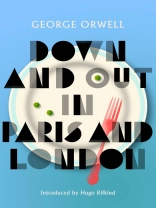Published in 1933, and still relevant today, Orwell’s first full-length work is a compassionate and insightful description of the life of the working poor in Paris and the homeless in London.
Written when Orwell was a struggling writer in his twenties, he vividly documents a world of unrelenting squalor – sleeping in bug-infested hostels and doss houses, working as a plongeur in a Paris hotel, surviving on scraps and cigarette butts, living alongside tramps, a pavement artist and a starving Russian ex-army captain.
Exposing a shocking, previously-hidden world to his readers, Orwell gave a human face to the statistics of poverty for the first time – and in doing so, found his voice as a writer.
'Orwell was the great moral force of his age' – Spectator
Despre autor
Hugo Rifkind is a columnist, critic and leader writer for The Times and a presenter on Times Radio, having formerly been a columnist for the Spectator, GQ and the Herald. He is a regular panellist on BBC Radio 4’s comedy show The News Quiz, and an occasional guest on television shows that aren’t supposed to be funny at all. He was born and raised in Edinburgh, studied in Cambridge, and now lives in North London in a house where everybody else speaks German, including the dog.












